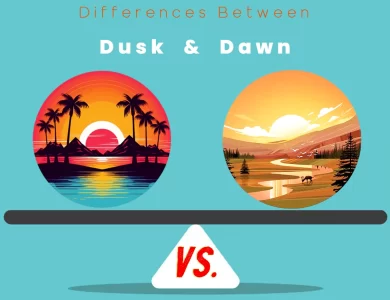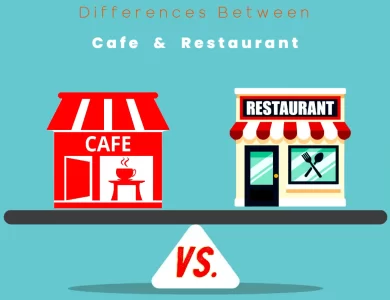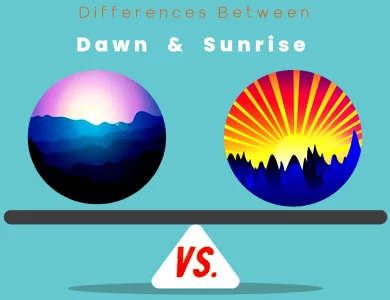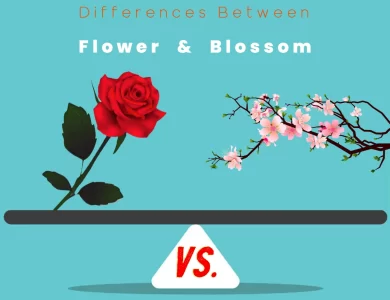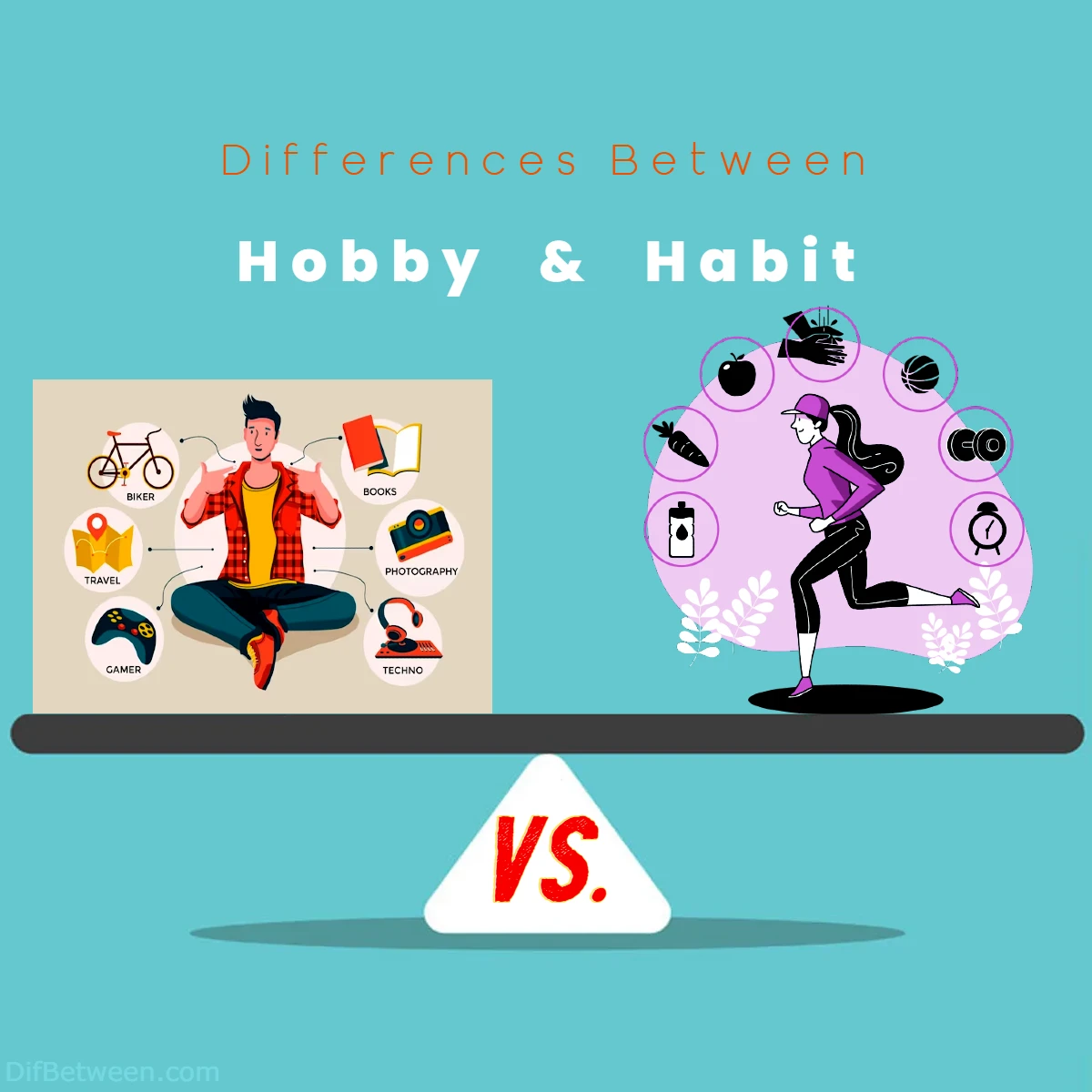
| Aspect | Hobbies | Habits |
|---|---|---|
| Motivation and Intention | Driven by personal interest and passion. | May or may not involve conscious motivation. |
| Voluntary vs. Involuntary | Pursued willingly and voluntarily. | Can become involuntary behaviors. |
| Emotional Fulfillment | A major source of emotional fulfillment. | Emotional impact varies based on the nature of the habit. |
| Nature of Activities | Can include diverse activities based on personal interests. | Tend to focus on specific actions or behaviors. |
| Time Commitment | Often pursued in leisure time as a choice. | Can involve a consistent time commitment as part of a routine. |
| Personal Growth and Identity | Often linked to personal growth and skill development. | May or may not directly contribute to personal growth. |
| Decision-Making | You decide when and how to engage in hobbies. | Habits often occur without conscious decision-making. |
| Enthusiasm | Fueled by passion and enjoyment. | Not necessarily associated with enthusiasm. |
| Impact on Behavior | Drives behavioral change and personal growth. | Influences behavior, both positively and negatively. |
| Repetitiveness | Activities are diverse and may change over time. | Often involve repetitive, consistent actions. |
| Purposeful or Unintentional | Typically purposeful and intentional choices. | Can be intentionally cultivated or develop unintentionally. |
| Cost | Expenses may vary but are usually tied to the pursuit of the hobby. | May or may not have associated costs. |
| Social Interactions | Often provide opportunities for social interactions. | Social interactions vary based on the nature of the habit. |
| Flexibility | Flexible in terms of when and how you engage in them. | Can be rigid in their daily or weekly routines. |
| Emotional Impact | Generally leads to positive emotional impact. | Emotional impact varies, can be positive or negative. |
| Skill Development | Often involves skill development and personal growth. | Skill development may or may not be a primary focus. |
| Long-Term Goals | May or may not be directly tied to long-term goals. | Often tied to long-term goals and behavioral changes. |
| Decision-Making | Often requires conscious decision-making. | Habits are often performed without conscious thought. |
| Social Connection | Often involves social connections and communities. | May or may not have a strong social aspect. |
| Goal Achievement | Goal setting may not be a primary focus. | Goal-oriented and instrumental in achieving objectives. |
| Personal Fulfillment | Significant source of personal fulfillment. | May or may not directly contribute to personal fulfillment. |
Whether you’re a passionate painter, a dedicated runner, or someone seeking to cultivate positive routines, the choices you make regarding hobbies and habits can significantly impact your well-being. So, let’s embark on this enlightening journey together and uncover the nuances that set hobbies and habits apart.
Differences Between Hobby and Habit
The main differences between a hobby and a habit lie in their fundamental nature and purpose. A hobby is a voluntary and passion-driven activity chosen for personal enjoyment, often contributing to emotional fulfillment and skill development. In contrast, a habit involves repetitive actions, which can be both intentional or unintentional, and aims to establish consistency in behavior or routine. While hobbies bring joy and personal growth, habits focus on discipline and efficiency in daily life. Understanding these distinctions empowers individuals to strike a harmonious balance between their passions and routines, shaping a more fulfilling life.
Defining
Hobbies: Passionate Pursuits
Hobbies are like the colorful strokes of a paintbrush on the canvas of life. They are activities that we engage in voluntarily, driven by our interests, passions, and desires. Hobbies are often a source of joy, relaxation, and personal fulfillment. These activities are not typically obligatory or routine; rather, they are chosen because they bring us pleasure.
Characteristics of Hobbies:
- Voluntary Engagement: Hobbies are pursued willingly, driven by personal interest or enjoyment.
- Passion and Enthusiasm: Hobbies are often fueled by a deep passion or enthusiasm for the activity.
- Varied Nature: Hobbies can encompass a wide range of activities, from gardening to painting, playing musical instruments, or even birdwatching.
- Leisure Time: They are usually undertaken during one’s leisure time, offering a break from daily responsibilities.
- Personal Fulfillment: Hobbies contribute to personal growth and satisfaction, enhancing one’s sense of identity and purpose.
Habits: Routine Rhythms
Habits, on the other hand, are like the steady beat of a drum in the background of our lives. They are repetitive actions or behaviors that we perform almost automatically, often without conscious thought. Habits can be positive or negative, and they are deeply ingrained in our daily routines.
Characteristics of Habits:
- Repetitive Actions: Habits are characterized by the regular repetition of specific actions or behaviors.
- Automaticity: They are often performed without conscious effort or deliberate decision-making.
- Routine Integration: Habits become an integral part of one’s daily life and are often associated with specific cues or triggers.
- Purposeful or Unintentional: Habits can be intentionally cultivated (e.g., daily exercise) or unintentionally formed (e.g., nail-biting).
- Impact on Behavior: Habits can have a significant impact on one’s overall behavior and lifestyle.
Now that we have defined the fundamental nature of hobbies and habits, let’s explore the key differences between these two aspects of our lives.
Motivation and Intention
Hobbies: Hobbies are driven by motivation, enthusiasm, and personal interest. They are chosen because they bring joy and fulfillment. When you engage in a hobby, it is a conscious choice based on your passion for the activity.
Habits: Habits, on the other hand, may not always involve conscious choice or motivation. While positive habits can be intentionally cultivated, many habits develop unintentionally and are driven by cues or triggers rather than personal passion.
| Aspect | Hobbies | Habits |
|---|---|---|
| Motivation | Driven by personal interest and enthusiasm. | May or may not involve conscious motivation. |
| Choice | A conscious choice made willingly. | Can be formed without deliberate intention. |
| Enthusiasm | Fueled by passion and enjoyment. | Not necessarily associated with enthusiasm. |
Voluntary vs. Involuntary
Hobbies: Engaging in a hobby is a voluntary act. You decide when and how you want to pursue your hobbies based on your preferences and schedule.
Habits: Habits can become involuntary behaviors that occur automatically in response to specific cues or triggers. Breaking a negative habit often requires conscious effort and intention.
| Aspect | Hobbies | Habits |
|---|---|---|
| Voluntary Engagement | Pursued willingly and voluntarily. | Can become involuntary behaviors. |
| Decision-Making | You decide when and how to engage in hobbies. | Habits often occur without conscious decision-making. |
Emotional Fulfillment
Hobbies: Hobbies are a significant source of emotional fulfillment. They bring joy, satisfaction, and a sense of accomplishment, contributing positively to mental well-being.
Habits: While habits can influence emotions, their primary purpose is not necessarily emotional fulfillment. Positive habits, such as regular exercise, can lead to improved mood, but habits can also include negative behaviors that lead to stress or anxiety.
| Aspect | Hobbies | Habits |
|---|---|---|
| Emotional Impact | A major source of emotional fulfillment. | Emotional impact varies based on the nature of the habit. |
Nature of Activities
Hobbies: Hobbies encompass a wide range of activities that are chosen based on personal interests and passions. They are often diverse and may change over time.
Habits: Habits can be more focused on specific actions or routines, such as daily exercise, smoking, or nail-biting. They are often repetitive in nature.
| Aspect | Hobbies | Habits |
|---|---|---|
| Variety of Activities | Can include diverse activities based on personal interests. | Tend to focus on specific actions or behaviors. |
Time Commitment
Hobbies: Hobbies are typically pursued during one’s leisure time, making them a choice rather than a commitment. You engage in hobbies when you have the time and desire.
Habits: Habits often become part of your daily or weekly routine, and they may require a consistent time commitment. For example, if you have a habit of daily meditation, it becomes a regular part of your schedule.
| Aspect | Hobbies | Habits |
|---|---|---|
| Time Commitment | Often pursued in leisure time as a choice. | Can involve a consistent time commitment as part of a routine. |
Personal Growth and Identity
Hobbies: Hobbies contribute to personal growth and identity. They help you explore your interests, develop new skills, and shape your sense of self.
Habits: Habits may or may not contribute directly to personal growth. Positive habits, such as reading regularly, can enhance knowledge and self-improvement, but not all habits have this effect.
| Aspect | Hobbies | Habits |
|---|---|---|
| Personal Growth | Often linked to personal growth and skill development. | May or may not directly contribute to personal growth. |
Benefits and Drawbacks
Now that we have a clearer understanding of the differences between hobbies and habits, let’s explore the benefits and potential drawbacks associated with each.
Benefits of Hobbies
Emotional Well-Being
Hobbies are renowned for their positive impact on emotional well-being. Engaging in activities you are passionate about can lead to increased happiness, reduced stress, and a sense of accomplishment. Whether it’s painting, gardening, or playing a musical instrument, hobbies provide an emotional outlet and a source of joy.
Stress Reduction
Hobbies serve as a powerful tool for stress reduction. They offer an escape from the demands of daily life, allowing you to immerse yourself in something you love. This break from routine can help lower stress levels and promote relaxation.
Personal Fulfillment
One of the most significant advantages of hobbies is the sense of personal fulfillment they bring. They contribute to your sense of identity and purpose, helping you discover new passions and talents. This self-discovery can boost self-esteem and overall life satisfaction.
Skill Development
Many hobbies involve the acquisition of new skills. Whether you’re learning to cook exotic cuisines or honing your photography skills, hobbies provide an avenue for continuous learning and personal growth. These skills can be transferable to other areas of your life.
Social Connections
Hobbies often create opportunities for social interactions. Joining clubs or groups related to your hobby allows you to connect with like-minded individuals, fostering friendships and a sense of community.
Drawbacks of Hobbies
Time Commitment
While hobbies offer numerous benefits, they can also require a significant time commitment. Depending on the nature of your hobby and your level of involvement, you may find yourself dedicating substantial chunks of your leisure time to it. This can sometimes lead to a lack of balance in your life, with other important responsibilities or interests taking a backseat.
Cost
Certain hobbies can be financially demanding. Whether it’s purchasing equipment for a sport, art supplies, or musical instruments, the expenses associated with hobbies can add up. It’s essential to budget wisely to avoid financial strain.
Potential for Obsession
While enthusiasm for a hobby is generally positive, it can sometimes tip into obsession. When your passion for a hobby becomes all-consuming, it may negatively impact other aspects of your life, such as relationships or work.
Benefits of Habits
Consistency
Habits are all about consistency. When you cultivate positive habits, such as daily exercise or a healthy eating routine, you establish a regular rhythm in your life. This consistency can lead to improved physical and mental health.
Efficiency
Habits streamline decision-making. When a behavior becomes habitual, you don’t need to deliberate over it every time. For example, if you have a habit of waking up early and going for a run, it becomes a seamless part of your morning routine.
Goal Achievement
Habits are powerful tools for achieving long-term goals. By breaking down big objectives into small, manageable habits, you can steadily work toward your aspirations. This approach can enhance productivity and personal development.
Behavior Modification
Negative habits can be replaced with positive ones through conscious effort. This process, known as habit replacement, can be instrumental in overcoming addiction or unhealthy behaviors.
Time Management
Habits can help you make the most of your time. For instance, having a habit of setting aside focused work time during the day can significantly boost your productivity.
Drawbacks of Habits
Resistance to Change
Habits can be challenging to change, especially if they are deeply ingrained. Breaking a negative habit often requires a considerable amount of effort, determination, and time.
Lack of Awareness
Habits can sometimes lead to a lack of awareness or mindfulness. When you perform an action habitually, you may do so without conscious thought, potentially missing out on the experience itself.
Negative Impact
Negative habits, such as smoking or excessive screen time, can have detrimental effects on health and well-being. These habits may be difficult to break and can lead to long-term consequences.
Balancing Hobbies and Habits
The key to a fulfilling and well-rounded life lies in finding the right balance between hobbies and habits. Both play essential roles in shaping who we are and how we navigate the world.
Tips for Balancing Hobbies and Habits
- Prioritize Self-Care: Ensure that both your hobbies and habits contribute positively to your well-being. They should reduce stress, promote happiness, and enhance your overall quality of life.
- Set Clear Goals: Define your objectives for both hobbies and habits. What do you hope to achieve? Having clear goals helps you stay motivated and focused.
- Manage Your Time: Allocate time for both your hobbies and habits in your daily or weekly schedule. This prevents one from overpowering the other.
- Assess Impact: Regularly evaluate how your hobbies and habits are influencing your life. Are they helping you grow, or are they causing stress or imbalance?
- Adapt and Evolve: Recognize that your interests and needs may change over time. Be willing to adapt your hobbies and habits to align with your evolving priorities.
- Seek Support: If you struggle with negative habits, don’t hesitate to seek support from friends, family, or professionals. Breaking harmful habits may require external help.
- Mindful Engagement: Whether you’re pursuing a hobby or practicing a habit, strive to engage in a mindful and present manner. This enhances your overall experience and awareness.
Hobby or Habit : Which One is Right Choose for You?
In the intricate dance of life, we often find ourselves at a crossroads, torn between cultivating hobbies that ignite our passions and nurturing habits that bring discipline and consistency into our routines. So, how do you decide which path is right for you? In this guide, we’ll help you navigate this choice by exploring the considerations, benefits, and potential outcomes of embracing hobbies or habits.
Understanding Your Needs and Goals
Hobbies: Fueling Your Passions
Consider Hobbies If:
- You Seek Joy and Creativity: Hobbies are a wellspring of joy and creativity. If you’re yearning for activities that light up your soul and allow you to express yourself, hobbies are a great choice.
- You Desire Personal Fulfillment: Hobbies often contribute to a profound sense of personal fulfillment. Engaging in activities that resonate with your interests can boost your self-esteem and overall life satisfaction.
- You Want to Explore Your Interests: If you’re curious and enjoy exploring new interests and skills, hobbies offer a diverse array of opportunities to delve into.
Benefits of Hobbies:
- Emotional Well-Being: Hobbies are known for their positive impact on emotional well-being, reducing stress, and fostering happiness.
- Skill Development: Many hobbies involve skill development, which can enrich your life and enhance your self-confidence.
- Social Connections: Hobbies often provide opportunities to connect with like-minded individuals, building meaningful relationships.
Habits: Cultivating Consistency
Consider Habits If:
- You Value Discipline: Habits are all about discipline and consistency. If you want to instill regularity and structure in your life, habits are a powerful tool.
- You Have Specific Goals: Habits are instrumental in achieving specific goals, whether they relate to health, productivity, or personal development.
- You Seek Long-Term Benefits: Habits offer long-term benefits and lasting change. If you’re focused on sustainable improvements, habits are the way to go.
Benefits of Habits:
- Consistency: Habits create a consistent routine, streamlining decision-making and promoting efficient use of time.
- Goal Achievement: They are effective for breaking down big goals into manageable steps, facilitating progress and achievement.
- Behavior Modification: Negative habits can be replaced with positive ones, leading to improved overall well-being.
Finding the Balance
While hobbies and habits serve distinct purposes, they don’t have to exist in isolation. In fact, finding a balance between the two can be the key to a harmonious and fulfilling life. Here’s how:
Identify Your Priorities
Begin by identifying your top priorities. What matters most to you? Is it personal growth, physical health, creative expression, or professional success? Understanding your priorities will guide your choices.
Set Clear Goals
For both hobbies and habits, set clear and achievable goals. Define what you want to accomplish. Your goals will help you stay motivated and provide direction for your choices.
Allocate Your Time
Create a schedule that allocates time for both your hobbies and habits based on your priorities and goals. Balance is about intentional time allocation.
Monitor and Adjust
Regularly evaluate how your chosen hobbies and habits are aligning with your goals and priorities. Be willing to make adjustments if needed. Flexibility is key to maintaining balance.
Seek Support
Share your goals and challenges with someone you trust, whether it’s a friend, family member, or mentor. Support and accountability can make a significant difference.
Practice Self-Compassion
Finding the right balance between hobbies and habits is an ongoing journey. Be patient with yourself and embrace the process. Life is dynamic, and your balance may evolve over time.
Conclusion: Your Unique Path
In the grand tapestry of life, there is no one-size-fits-all answer to the question of whether hobbies or habits are right for you. Your path is uniquely yours, shaped by your desires, goals, and priorities.
Embrace hobbies that bring you joy and fulfillment, allowing your creative spirit to soar. Cultivate habits that support your well-being and help you achieve your long-term objectives. And above all, find the harmony between these two threads, weaving a life that resonates with your essence and reflects your true self.
FAQs
The fundamental difference between a hobby and a habit lies in their nature and purpose. A hobby is an activity pursued voluntarily based on personal interests and passions, often providing joy and personal fulfillment. On the other hand, a habit involves repetitive actions, which can be intentional or unintentional, aiming to establish consistency in behavior or routine.
Hobbies contribute to personal growth and well-being by offering opportunities for skill development, creative expression, and emotional fulfillment. Engaging in activities you are passionate about can reduce stress, boost self-esteem, and enhance overall life satisfaction.
Hobbies can encompass a wide range of activities, including painting, gardening, playing musical instruments, cooking, reading, hiking, and birdwatching, among many others. They are diverse and chosen based on individual interests and passions.
Yes, habits can be both positive and negative. Positive habits, such as daily exercise, healthy eating, or regular meditation, contribute to well-being and personal growth. Negative habits, like smoking or excessive screen time, can have detrimental effects on health and well-being.
Habits are instrumental in achieving goals by breaking down big objectives into manageable, consistent actions. They create a structured routine that promotes efficiency and productivity, facilitating progress toward long-term goals.
Yes, it is possible to balance hobbies and habits in daily life. Finding the right balance involves setting clear priorities, allocating time intentionally, and regularly evaluating how these elements align with your goals and well-being. Striking a balance can lead to a more harmonious and fulfilling life.
Read More:


